| Bulk Discounts Prices | |
| Quantity | Price |
| 1 | $186.62 |
CarboCal is a fully soluble, nitrate-free calcium fertiliser formulated with organic compounds and boron to enhance fruit quality, firmness, and resistance to disease. Developed by AgroBest Australia, CarboCal provides efficient calcium uptake even under challenging growing conditions. Its organic acid complex ensures fast assimilation through both foliar and root applications, making calcium more mobile and bioavailable within the plant. The formulation supports flowering, strengthens cell walls, and helps prevent splitting in stone fruit varieties.
This liquid calcium product contains no nitrate or chloride, making it safe for all growth stages and compatible with most nutrient programs. It is ideal for fruit, vine, and vegetable crops, helping plants maintain structural integrity, greenness, and photosynthetic efficiency while reducing stress and improving yield consistency.
| Component | % w/v | % w/w |
|---|---|---|
| Calcium (as Organic Acid Complex) | 10 % w/v | 7.1 % w/w |
| Boron (as Organic Acid Complex) | 1 % w/v | 0.7 % w/w |
| Biostimulants (as Organic Acid Complex) | 47.5 % w/v | 36.5 % w/w |
| Characteristic | Value |
|---|---|
| Colour | Dark Brown |
| Specific Gravity | 1.25 - 1.3 |
| pH | 4.5 - 6.5 |
| Sizes Available | 20 Litre |
| Crop Type | Rate / ha | Dilution | Application Timing |
|---|---|---|---|
| Apples | 3 - 6 L | 1:100 | Foliar, every 7 to 14 days after petal fall |
| Stone Fruit, Tropical Fruit | 3 - 6 L | 1:150 | 3 to 5 foliar applications per season to improve firmness and quality |
| Vegetables | 5 - 8 L | 1:150 | As required |
| Strawberries | 5 - 8 L | 1:150 | As required |
| Vines | 4 - 6 L | 1:100 | During vegetative and fruiting phases |
| All Crops (Fertigation) | 5 - 10 L | 1:20 | Injection / dripper irrigation |
| Macadamia | 6 - 10 L | 1:200 | Foliar, applied at pre-flowering and nut set |
CarboCal is a premium, nitrate-free calcium fertiliser that delivers fast and efficient calcium uptake through both foliar and fertigation applications. Its organic acid complex enhances nutrient movement, reduces stress, and strengthens plant tissues. By improving calcium availability, CarboCal increases fruit firmness, shelf life, and disease resistance while minimising fruit splitting. It is safe to use at all growth stages and can be combined with other trace elements to improve nutrient efficiency.
How does CarboCal improve fruit quality and calcium uptake in plants?
CarboCal’s unique organic acid complex allows calcium, a traditionally immobile element, to move efficiently through plant tissues. It provides consistent nutrient delivery even under stress conditions. Here’s how CarboCal works to support healthier, more productive crops:
Regular use of CarboCal strengthens plant structure, improves fruit quality, and helps growers achieve better yields with fewer physiological disorders linked to calcium deficiency.
| File | Title | File Description | Type | Section |
|---|---|---|---|---|
| CarboCal_2023.pdf | CarboCal Bio Stimulant Trace Elements | Fully soluble nitrate-free organic calcium bonded with organic compounds and boron to promote fruit quality and disease resistance. | Catalogue | Document |
Sydney, Australia — October 20: In recent days, Sydney welcomed a delegation from the International Olive Council, comprising Maria Juarez, Head of Promotion and Economic Affairs; Dr. Imene Trabelsi Trigui, Head of Promotion; and Dr. Wenceslao Moreda, Principal Scientist and IOC specialist.
Their visit was intended to deliver a program of events in Sydney, including a two-day technical tasting workshop and a formal networking cocktail reception.
The objectives of these events were twofold. The workshop sought to strengthen collaboration between Australian growers, producers, and the International Olive Council, while the networking cocktail reception united key stakeholders — including government officials, media representatives, chefs, and producers — in a dynamic exchange. A highlight of the evening was the introduction of the newly appointed Ambassador, Mark Olive, who captivated guests with a specially crafted menu featuring Australian Indigenous ingredients such as saltbush, kangaroo, bush tomato, and native peppers, elegantly paired with a selection of Australian Extra Virgin Olive Oils.
“Advancing sustainability in olive oil production is essential to tackling climate change. We encourage producers to embrace sustainable methods that not only reduce environmental impact but also help optimize production costs. Australia’s strengthened partnership with the IOC represents a step toward a healthier and more sustainable future. Our mission is to promote greater awareness of olive oil’s benefits and sustainable practices, fostering improved and healthier consumption.” — Dr. Imene Trabelsi, Head of Promotions, International Olive Council
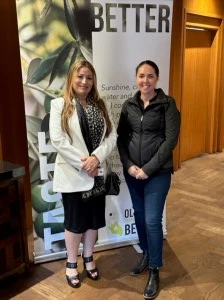

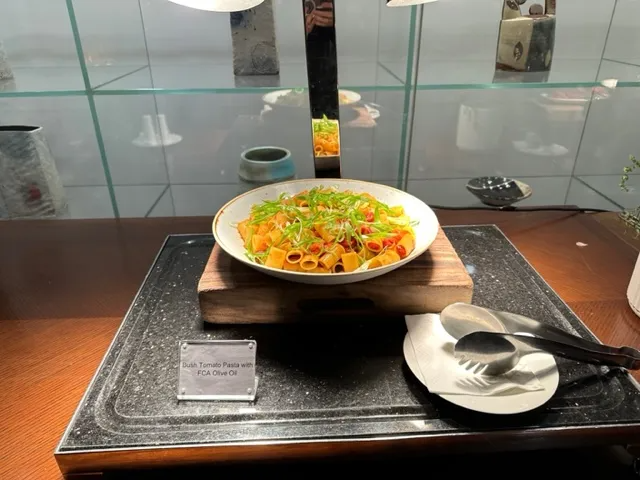

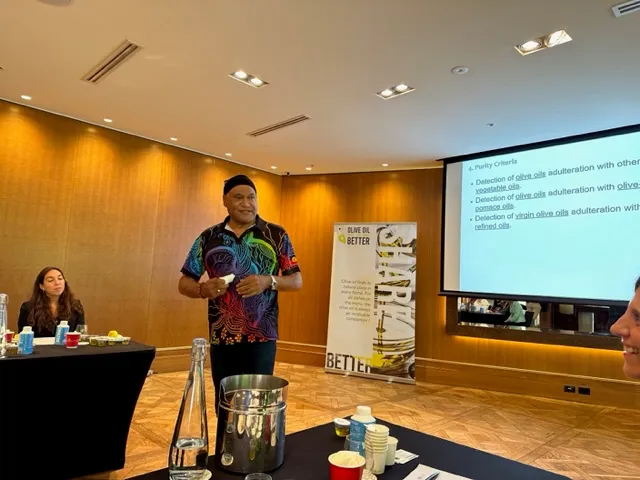
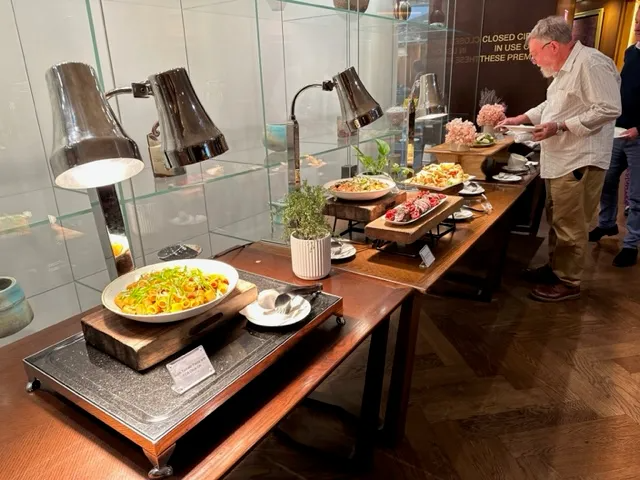
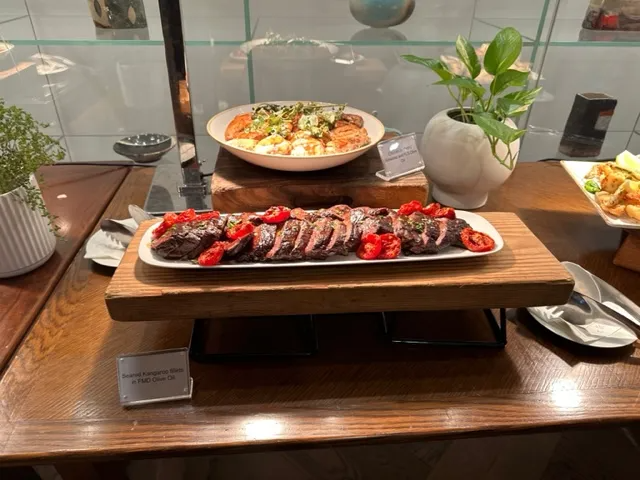
The two-day technical workshop was led by Dr. Wenceslao Moreda, an IOC specialist and Chair of the eWG of the Codex Committee on Fats and Oils (CCFO). A distinguished member of the Spanish National Research Council, Dr. Moreda holds an impressive record of over 75 research publications dating back to 1995. The opening day of the workshop focused on sensory evaluation, addressing both the physical and psychological dimensions of the organoleptic process while emphasizing the importance of proper production conditions in compliance with the rigorous standards established by the International Olive Council. The discussions provided valuable insight into the rationale behind these standards and the allowances for specific variances, reinforcing their role as the overarching global benchmark.


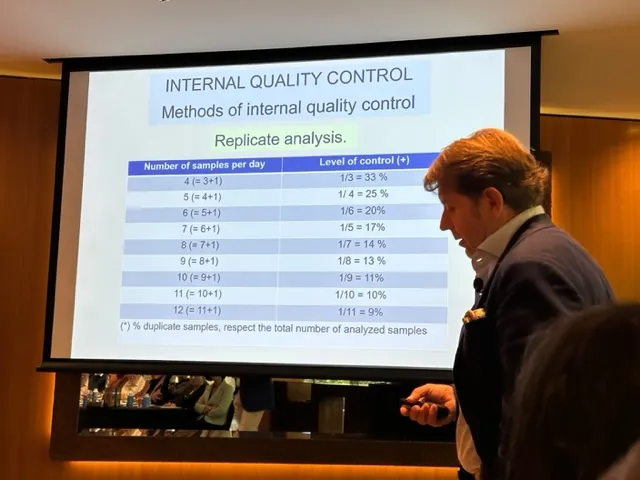
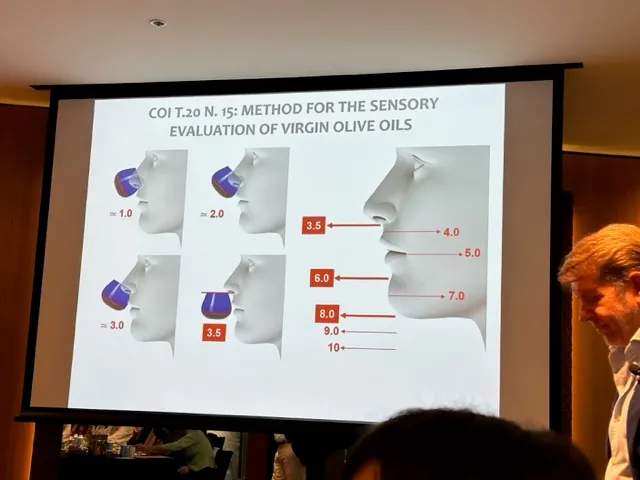
On the second day, the workshop focused on the quality and purity of Extra Virgin Olive Oil, examining internal quality control measures and evaluation criteria. The program concluded with an in-depth review of health-related parameters associated with olive oil, attended by nutrition experts. The breadth of technical knowledge shared proved highly valuable, offering participants a holistic understanding of the journey from production to final product from an organoleptic perspective. During the session, the IOC also announced the development of a new website dedicated to communicating the extensive health benefits of olive oil.
The International Olive Council continues to be a steadfast leader in shaping the global olive oil sector, establishing standards and fostering international collaboration essential to the industry’s advancement. As these remarkable events draw to a close, they leave a lasting impression of unity, progress, and shared commitment to the treasured ‘liquid gold’—extra virgin olive oil.
Beyond celebrating the richness and versatility of olive products, these gatherings underscored the critical importance of cooperation and knowledge exchange within the global olive community.
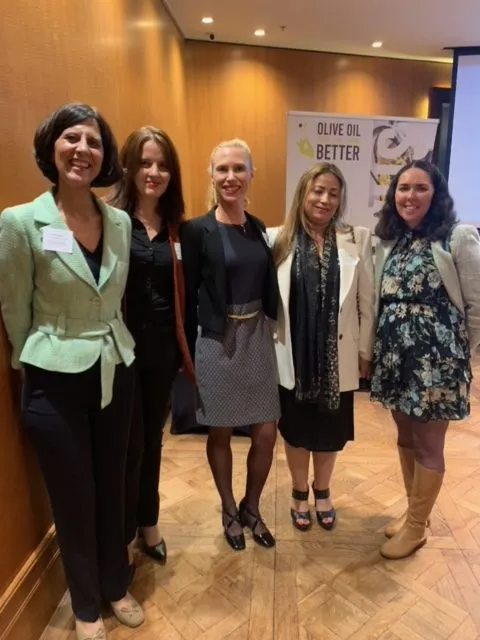

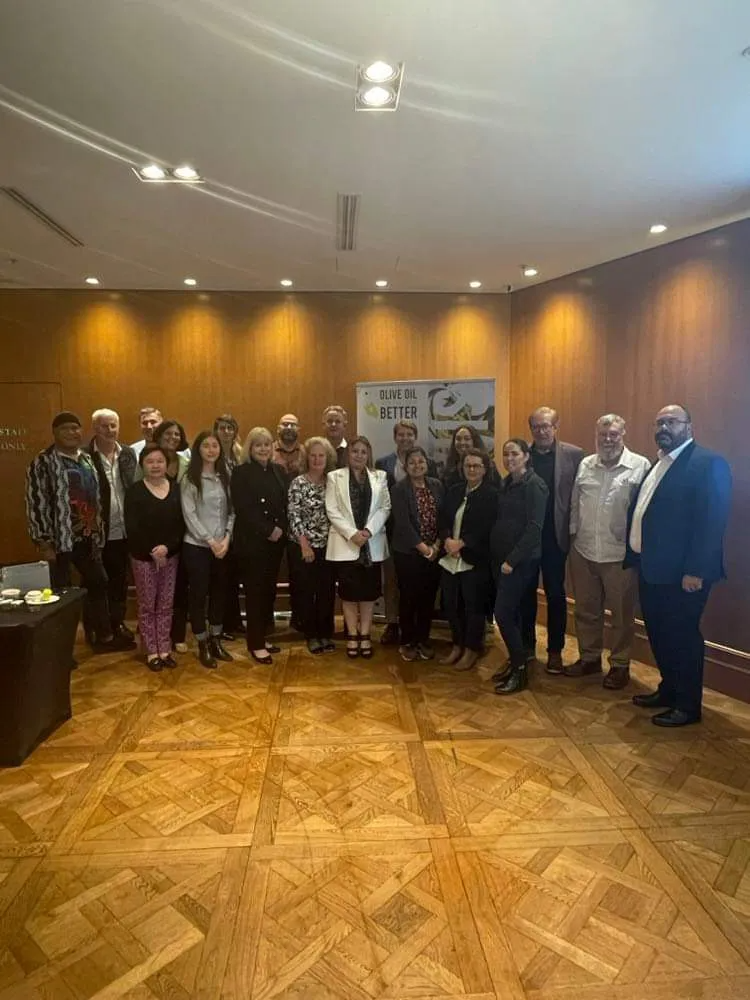


The International Olive Council (IOC) functions as the leading intergovernmental organization responsible for establishing the regulatory framework governing the global olive oil sector. Although Australia is not yet an official IOC member, it actively supports the organization by assisting emerging industries in adopting and applying international standards. The cooperation demonstrated during recent events underscored the IOC’s global significance and lasting impact.
The IOC also recognizes the diversity of growing conditions worldwide, which may lead to parameter variations outside of established guidelines in certain producing regions. Importantly, the IOC administers the only legally binding international standard for olive oil, reinforcing its critical role from a legislative and regulatory perspective. Complementing this, the Australian Olive Oil Association (AOOA) is acknowledged for its collaborative work with the IOC, further highlighting the importance of sustained international cooperation within the sector.
IOC Membership Process
The International Olive Council maintains strict criteria for membership. Participation is reserved exclusively for governments or international organizations empowered to negotiate, conclude, and implement international agreements, particularly those relating to commodities.
When a country seeks to join the IOC, its government must formally apply to the Council of Members, typically through its Ministry of Foreign Affairs, another relevant ministry, or its Embassy in Spain. The Council then reviews the application, establishes terms and conditions of accession — including financial contributions to the IOC budget — and sets a deadline for depositing the instrument of accession with the Secretary-General of the United Nations in New York, who serves as the official depository of the Agreement.
Upon successful deposition, the applicant nation becomes a full IOC Member. Private companies and individuals are not eligible for membership. Additionally, all European Union Member States are automatically represented in the IOC through the EU’s membership, without the need for separate applications.
In Australia’s case, stronger collaboration between national associations, government agencies, and the IOC will be essential for achieving closer alignment with international standards. Leadership from within the Australian olive oil industry itself will be critical in driving forward discussions on potential membership.
IOC Health Website
The IOC has recently launched a new website serving as a comprehensive reference hub on olive oil and health.
IOC Standards, Methods, and Guidelines
The IOC continues to provide the latest updates on trade standards for olive oil and table olives, as well as official testing protocols, sensory (organoleptic) assessment methods, and quality management practices.
Sydney, Australia — October 20: In recent days, Sydney welcomed a delegation from the International Olive Council, comprising Maria Juarez, Head of Promotion and Economic Affairs; Dr. Imene Trabelsi Trigui, Head of Promotion; and Dr. Wenceslao Moreda, Principal Scientist and IOC specialist.
Their visit was intended to deliver a program of events in Sydney, including a two-day technical tasting workshop and a formal networking cocktail reception.
The objectives of these events were twofold. The workshop sought to strengthen collaboration between Australian growers, producers, and the International Olive Council, while the networking cocktail reception united key stakeholders — including government officials, media representatives, chefs, and producers — in a dynamic exchange. A highlight of the evening was the introduction of the newly appointed Ambassador, Mark Olive, who captivated guests with a specially crafted menu featuring Australian Indigenous ingredients such as saltbush, kangaroo, bush tomato, and native peppers, elegantly paired with a selection of Australian Extra Virgin Olive Oils.
“Advancing sustainability in olive oil production is essential to tackling climate change. We encourage producers to embrace sustainable methods that not only reduce environmental impact but also help optimize production costs. Australia’s strengthened partnership with the IOC represents a step toward a healthier and more sustainable future. Our mission is to promote greater awareness of olive oil’s benefits and sustainable practices, fostering improved and healthier consumption.” — Dr. Imene Trabelsi, Head of Promotions, International Olive Council







The two-day technical workshop was led by Dr. Wenceslao Moreda, an IOC specialist and Chair of the eWG of the Codex Committee on Fats and Oils (CCFO). A distinguished member of the Spanish National Research Council, Dr. Moreda holds an impressive record of over 75 research publications dating back to 1995. The opening day of the workshop focused on sensory evaluation, addressing both the physical and psychological dimensions of the organoleptic process while emphasizing the importance of proper production conditions in compliance with the rigorous standards established by the International Olive Council. The discussions provided valuable insight into the rationale behind these standards and the allowances for specific variances, reinforcing their role as the overarching global benchmark.




On the second day, the workshop focused on the quality and purity of Extra Virgin Olive Oil, examining internal quality control measures and evaluation criteria. The program concluded with an in-depth review of health-related parameters associated with olive oil, attended by nutrition experts. The breadth of technical knowledge shared proved highly valuable, offering participants a holistic understanding of the journey from production to final product from an organoleptic perspective. During the session, the IOC also announced the development of a new website dedicated to communicating the extensive health benefits of olive oil.
The International Olive Council continues to be a steadfast leader in shaping the global olive oil sector, establishing standards and fostering international collaboration essential to the industry’s advancement. As these remarkable events draw to a close, they leave a lasting impression of unity, progress, and shared commitment to the treasured ‘liquid gold’—extra virgin olive oil.
Beyond celebrating the richness and versatility of olive products, these gatherings underscored the critical importance of cooperation and knowledge exchange within the global olive community.





The International Olive Council (IOC) functions as the leading intergovernmental organization responsible for establishing the regulatory framework governing the global olive oil sector. Although Australia is not yet an official IOC member, it actively supports the organization by assisting emerging industries in adopting and applying international standards. The cooperation demonstrated during recent events underscored the IOC’s global significance and lasting impact.
The IOC also recognizes the diversity of growing conditions worldwide, which may lead to parameter variations outside of established guidelines in certain producing regions. Importantly, the IOC administers the only legally binding international standard for olive oil, reinforcing its critical role from a legislative and regulatory perspective. Complementing this, the Australian Olive Oil Association (AOOA) is acknowledged for its collaborative work with the IOC, further highlighting the importance of sustained international cooperation within the sector.
IOC Membership Process
The International Olive Council maintains strict criteria for membership. Participation is reserved exclusively for governments or international organizations empowered to negotiate, conclude, and implement international agreements, particularly those relating to commodities.
When a country seeks to join the IOC, its government must formally apply to the Council of Members, typically through its Ministry of Foreign Affairs, another relevant ministry, or its Embassy in Spain. The Council then reviews the application, establishes terms and conditions of accession — including financial contributions to the IOC budget — and sets a deadline for depositing the instrument of accession with the Secretary-General of the United Nations in New York, who serves as the official depository of the Agreement.
Upon successful deposition, the applicant nation becomes a full IOC Member. Private companies and individuals are not eligible for membership. Additionally, all European Union Member States are automatically represented in the IOC through the EU’s membership, without the need for separate applications.
In Australia’s case, stronger collaboration between national associations, government agencies, and the IOC will be essential for achieving closer alignment with international standards. Leadership from within the Australian olive oil industry itself will be critical in driving forward discussions on potential membership.
IOC Health Website
The IOC has recently launched a new website serving as a comprehensive reference hub on olive oil and health.
IOC Standards, Methods, and Guidelines
The IOC continues to provide the latest updates on trade standards for olive oil and table olives, as well as official testing protocols, sensory (organoleptic) assessment methods, and quality management practices.